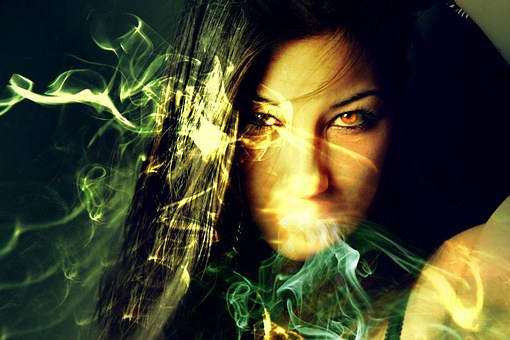I hope you’re ready because we’re about to burn through this topic faster than thermite through the hood of my rival’s new car.

Not that his car did anything wrong mind you, but maybe this will teach him not too… never mind.
Because we’re talking, I’m assuming that you are a storyteller (novelist, screenwriter, game developer, etc.), and you are working on some kind of extraordinary system (advanced tech, traditional magic, or crazy monsters) to add to your story. At this point, you should already be familiar with the concepts of hard and soft magic whether you learned it from me or read about it in Sanderson’s Laws of Magic. You may even have decided where on the spectrum you want your system to sit.
But there’s more to consider.
Will your system and story benefit most from an extrapolated and logical system? Would your story benefit more from many disparate, even random, effects and abilities?
While rational magic systems can provide a lot of benefits to your story, today we will cover 7 simple reasons you might need a nebulous magic system in your story. But before we get to the reasons, let’s review the basic definition of nebulous magic.
What is Nebulous Magic?
Nebulous magic is the natural counterpart to rational magic. While rational magic relies on logic and extrapolation, nebulous systems are much more flexible and random. Whenever placing a system on this axis, it always comes back to the audience’s ability to understand and predict portions of the system without seeing them first.
Think of it like an iceberg.

A Rational Iceberg 
A Nebulous Iceberg
If it’s one giant block of ice, the more we see and study it, the better we can estimate the characteristics of the parts we can’t see. On the other hand, if it’s actually a dozen of smaller ice blocks, then examining one won’t tell us much about the others.
For example, let’s compare Avatar The Last Airbender and Harry Potter. In Avatar, the audience can think through and even predict most of the powers and effects displayed throughout the series. In Harry Potter, magic only works specifically as shown. We know that expelliarmus will relieve an opponent of their wand, but what about a book, knife, or gun? These applications remain hidden and the audience cannot trust their suspicions until it happens.
Is this making sense? I hope so because we need to push ahead to the 7 signs and it seems a nearby car has mysteriously caught fire. I mean, what are the odds of that happening? But seriously, we should go.
If you need more information, you can always find it here.

The 7 Reasons You Need
a Nebulous Magic System
Reason #1: You Want Your System to Feel Magical
Building your system so the audience can’t predict unrevealed facets of the system reinforces a sense of the unknown. No matter how much you show, there’s always that piece just beyond sight or something that hasn’t been discovered yet. While rational systems lend themselves to replicating the feel of science and technology, nebulous systems often feel wondrous and reinforce a feeling of exploration.
If you want a wild and unpredictable system like in Harry Potter or even just a modular system made of dozens of discrete parts like in Spiderman or X-Men, you might need a nebulous magic system.
Reason #2: You Want to Explore Broadly
How simple is your system? Do you have a cluster of core ideas or an overwhelming horde of options, effects, and general awesomeness to unleash upon your unsuspecting audience?
If you have numerous ideas you want to display in your story, you likely need a nebulous magic system.
The more you add, the less you thoroughly you can explore the inner workings of the system, which will leave your audience unable to extrapolate information on their own. And there’s nothing wrong with that!
Think of it like leaving evidence at a crime scene.

If you want someone baffled by the carnage inflicted on their car, you take special care to remove all evidence and leave them wondering how it happened and what else might be in store.
Reason #3: You Want to Emphasize Character Emotion
If you read a lot of fantasy, you will find many systems possess a connection between the emotions of the user and the magic itself. Characters will find themselves digging just a little deeper for that last shred of power and moments of personal development will generate explosions of power.
This may seem overdone, but storytellers use it so often for a reason.
Forging a connection like this gives you as a storyteller additional tools to display and emphasize the emotional stability and growth of your characters. Due to the nature of emotions, you will probably want a nebulous magic system to manage this connection.
Reason #4: You Want Each User to Feel Unique
By their very nature, rational systems are consistent throughout the story. If one character becomes a user, they will often have the same abilities as anyone else. That’s just the price you pay. Nebulous systems are different. Without the need to maintain homogeneity and logical patterns through the entire system, you are free to create small pockets that function independently of one another.

If you want each character to be unique with strange powers wielded only by them, you likely need a nebulous magic system to make this work.
Reason #5: You Want an Ensemble of Users
I’m just going to say it. You want to build your own version of The Avengers (or possibly the Revengers).
There’s nothing wrong with that. Building a team of people with complementary abilities to accomplish tasks they could never do alone is immensely satisfying. This works best when each character has a particular set of skills and abilities they bring to the table.
If you want to emphasize the power of ensembles in your story, a nebulous system will serve you well with individual pieces that combine into a greater whole.
Reason #6: You Have a Whacky, Random Sense of Humor
Good humor is like good horror, it goes great with anything.
We can achieve humor in a wide variety of ways (I won’t even pretend to know them all), but one of my favorites is the outlandish, silly kind. If you want humor in your story similar to the Naked Gun Trilogy or Terry Pratchet’s The Wyrd Sisters, then you might consider using a nebulous magic system.

The disjointed, and random nature of a nebulous magic system can lend itself well to the ridiculous scenarios and shenanigans you might want to add.
Reason #7: You Want to Build Only What You Need
Building a robust, detailed system takes a lot of work. Sometimes it is worth the investment, but other times you just need to get something cool together and move forward. Maybe you want your current story to be fast and simple and you need little depth. Maybe a complicated, refined system is your goal but you don’t need the whole system built upfront.
Either way, you may need a nebulous magic system in order to balance your time between developing the system, creating the story, and assembling your team of Revengers to track down the jerk that slagged your car… Just something to consider.
That’s All for Now
Normally, this is where I’d tell you more about the Marvelous Magic Builder’s Mailing List, mention that I offer coaching services for all kinds of storytellers, or even highlight my workbook on building limitations for your magic.
Today I want to do something a little different and give a quick shout out to Mike Thayer.
Mike is an author of middle-grade fiction, and if you haven’t heard of it already, I highly recommend you check out his series The Epic Adventure of the Techno Wizard. They are quick reads and are a TON of fun, not to mention they’re brimming with interesting magic. I even interviewed him on the topic once upon a time.

If you love or have ever loved portal fantasy novels, give these books a look.
Full disclosure, Mike is a friend of mine, but that doesn’t change my recommendation for the series. I’ve just been thinking a lot about my friends lately and what we can all do in the writing community to rise and grow together. So check out book one in the series: Passage to Avalon, support a fellow storyteller, and well talk again soon. Thanks for stopping by.
Rowenson, out.



